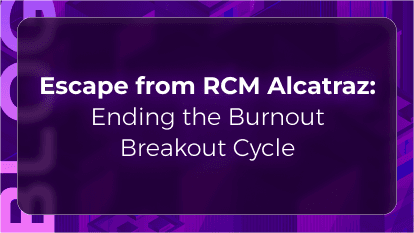


Ever seen the classic film Escape from Alcatraz, where Clint Eastwood meticulously plans a daring breakout from an inescapable prison? Well, Revenue Cycle Management (RCM) burnout can feel exactly like being trapped on The Rock, except your staff aren't plotting daring escapes—they're just quitting. If your healthcare organization's RCM team feels more like inmates than empowered employees, it's time to orchestrate your own jailbreak from the burnout cycle.
You're not alone. According to a 2023 Experian Health survey, 80% of healthcare providers face turnover rates in their RCM departments between 11% and 40%, significantly higher than the national average of 3.8%. Essentially, nearly half your team is always looking for an escape tunnel—hardly the foundation for smooth, profitable operations.
What's the warden keeping your staff imprisoned? Repetitive tasks, overwhelming compliance requirements, endless claim denials, and antiquated technology systems turn RCM jobs into a tedious sentence with no parole. HIMSS reveals nearly 40% of RCM employees suffer from severe burnout, transforming motivated professionals into exhausted prisoners of paperwork.
The Price of Constantly Digging New Tunnels
Every departing employee costs up to 200% of their annual salary in recruitment, onboarding, and training (source: ReveleMD). Picture it this way: if you're paying an RCM specialist $50,000 a year, turnover could set your organization back around $100,000 per exit. With a turnover rate hovering around 20-30%, you're not managing staff; you're running a very costly escape operation—only nobody's getting anywhere.
Frequent turnover disrupts billing processes, increases claim denials, and slows down revenue collection, locking your Accounts Receivable in solitary confinement.
Technology as Your Escape Tunnel
Routine tasks like manual eligibility checks, repetitive patient communications, and chasing denied claims aren't anyone's dream career. Yet, these tasks dominate your staff's days, intensifying burnout and turnover.
Innovative healthcare providers are turning to automation to liberate their RCM teams. According to Experian Health, automating routine tasks can reduce burnout by up to 60%, greatly enhancing employee satisfaction and retention. Technologies like Natural Language Processing (NLP), real-time eligibility verification APIs, and AI-driven predictive analytics take the tediousness out of RCM, elevating your employees from inmates to valued, productive professionals.
Consider automation the strategic escape plan—much like how data analytics changed the game in sports analytics. Instead of laboring in perpetual manual tasks, your team now uses automation to handle routine duties, freeing them for complex and rewarding tasks.
The Secret Behind Successful RCM Escapes
Forward-thinking organizations now utilize advanced calling platforms capable of managing hundreds of simultaneous calls, freeing staff to tackle more strategic issues. Platforms offering built-in compliance tools (SOC2 and HIPAA), real-time quality control, and seamless integration with over 4,000 payer databases don't just streamline operations—they transform the workplace into a desirable destination.
For example, industry leaders subtly partnering with specialized automation platforms—like CallBotics—have already broken out of their burnout Alcatraz, drastically reducing turnover, operational disruptions, and staff attrition.
Freedom Awaits—No Spoons Required
Escaping RCM burnout doesn't require a daring midnight breakout, fake IDs, or digging with spoons à la Clint Eastwood. Simply empower your team with smarter tools and watch morale, productivity, and profits rise. After all, even Alcatraz shut down eventually—and so should your organization's burnout prison. It's time to turn your RCM operation into a place where everyone actually wants to stay, because orange jumpsuits don't look cool on anyone!
CallBotics is the world’s first human-like AI voice platform for enterprises. Our AI voice agents automate calls at scale, enabling fast, natural, and reliable conversations that reduce costs, increase efficiency, and deploy in 48 hours.
For Further Queries Contact Us At: